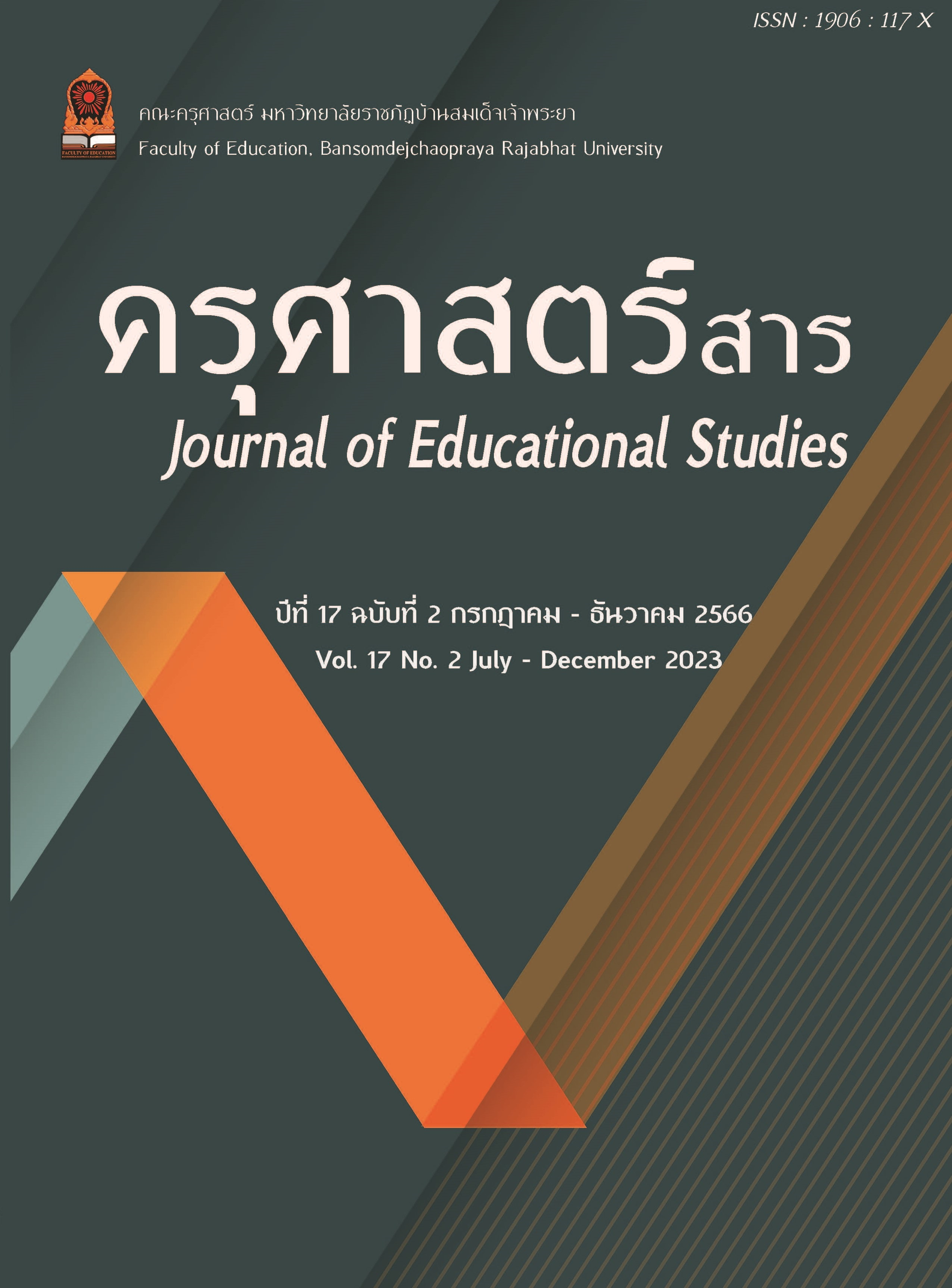การออกแบบเกมดิจิทัลเพื่อการเรียนรู้
คำสำคัญ:
เกมดิจิทัลเพื่อการเรียนรู้, การออกแบบเกมดิจิทัลเพื่อการเรียนรู้บทคัดย่อ
เกมดิจิทัลเพื่อการเรียนรู้ (Digital Games Based Learning: DGBL) เป็นแอปพลิเคชันหรือ โปรแกรมคอมพิวเตอร์ที่ออกแบบมาเพื่อส่งเสริมกระบวนการเรียนรู้และพัฒนาความรู้ของผู้เล่นเกมโดยใช้สื่อ ดิจิทัลและเทคโนโลยีในการนำเสนอเนื้อหาการเรียนรู้อย่างสร้างสรรค์ มีปฏิสัมพันธ์ และสนุกตื่นเต้น ส่วนที่ สำคัญของเกมดิจิทัลเพื่อการเรียนรู้ คือการผสานกันอย่างกลมกลืนระหว่างเนื้อหาการเรียนรู้และฟังก์ชันของ เกมเข้าด้วยกันจนทำให้เกิดประสิทธิภาพในการเรียนรู้ เกมดิจิทัลเพื่อการเรียนรู้ ได้กลายเป็นแนวทางการศึกษา ที่โดดเด่น ซึ่งใช้ประโยชน์จากลักษณะการมีส่วนร่วมและการโต้ตอบ ปฏิสัมพันธ์ของผู้เล่นกับเกมดิจิทัลทั้งนี้ เพื่อเพิ่มผลลัพธ์การเรียนรู้ บทความนี้มีวัตถุประสงค์ที่จะนำเสนอแนวคิด ประเภท กระบวนการออกแบบเกม ดิจิทัลเพื่อการเรียนรู้ 6 ขั้นตอน คือ 1. กำหนดเป้าหมายการเรียนรู้ 2. ศึกษากลุ่มเป้าหมาย 3. สร้างรายละเอียด ในเนื้อหา 4. เลือกแพลตฟอร์ม 5. ออกแบบเกม 6. ทดสอบและปรับปรุง ทั้งนี้เพื่อสร้างความเข้าใจให้นัก การศึกษา สามารถบูรณาการนำเอาลักษณะของเกมดิจิทัลมาใช้ในการออกแบบเกมดิจิทัลเพื่อการเรียนรู้ให้ บรรลุวัตถุประสงค์การเรียนรู้ และส่งเสริมให้ผู้เรียนเกิดพฤติกรรมการมีส่วนร่วมกับการเรียนได้
Downloads
เอกสารอ้างอิง
ปราวีณยา สุวรรณณัฐโชติ. (2561). สมรรถนะและบทบาทผู้สอนออนไลน์: การแสดงตนและสนับสนุนผู้เรียน. วารสารบัณฑิตศึกษา มหาวิทยาลัยราชภัฏวไลยอลงกรณ์ ในพระบรมราชูปถัมภ์, 12(2), น. 244-256.
ศูนย์พัฒนาและส่งเสริมการเรียนรู้ กระทรวงศึกษาธิการ. (2566). เกมส์แยกสี. การสร้างสีในโลก. กรุงเทพมหานคร: บริษัท อักษรศิลป์พาโนรามา จำกัด.
Amy Jo Kim. (2001). Gamification 101 : Design the player journey. Retrieved from https://www.slideshare.net/amyjokim/gamification-101-design-the-player-journey
Deterding, S., Dixon, D., Khaled, R., & Nacke, L. E. (2011). From game design elements to gamefulness: defining "gamification". Proceedings of the 15th International Academic MindTrek Conference: Envisioning Future Media Environments. ACM. Retrieved from https://doi.org/10.1145/2181037.2181040
Digital game-based learning (DGBL) model and development methodology for teaching history. Retrieved from https://www.academia.edu/78631847/Digital_Game_Based_Learning_DGBL_Model_and_Development_Methodology_for_Teaching_History
Erhel, S., & Jamet, E. (2013). Digital Game-Based Learning: Impact of Instructions and Feedback on Motivation and Learning Effectiveness. Computers and Education, 67, pp. 156-167. Retrieved from https://doi.org/10.1016/j.compedu.2013.02.019
Hamdi, L. F., Hantono, B. S., & Permanasari, A. E. (2022). Gamification Methods of Game‐Based Learning Applications in Medical Competence: A Systematic Literature Review. 2022 International Symposium on Information Technology and Digital Innovation (ISITDI 2022), Padang, Indonesia, pp. 50-54. Retrieved from https://ieeexplore.ieee.org/document/9944535
Hwang G.-J., Chiu L.-Y., & Chen C.-H. (2015). A contextual game-based learning approach to improving students' inquiry-based learning performance in social studies courses. Computers & Education, 81, pp. 13-25. Retrieved from https://dx.doi.org/10.1016/j.compedu.2014.09.006
Kengpol, A. (2018). The Thailand 4.0 Policy and Education Development. Procedia Computer Science, 139, pp. 258-265.
Lin, Y.-T. & Wang, T.-C. (2022). The Effects of Integrating Digital Board Game into Prime Factorization Learning on Elementary Students’ Flow Experience. 2022 International Conference on Advanced Learning Technologies (ICALT). Bucharest, Romania, pp. 122-124, doi: 10.1109/ICALT55010.2022.00044
Nor Azan Mat Zin, Azizah Jaafar & Wong Seng Yue (2009). Digital Game-Based Learning (Dgbl) Model And Development Methodology For Teaching History. Wseas Transactions On Computers, 2(8), pp. 322-333.
Pablo Moreno-Ger, Daniel Burgos, Iván Martínez-Ortiz, José Luis Sierra & Baltasar Fernández-Manjón. (2008). Educational game design for online education. Comput. Hum. Behav., 24(6), pp. 2530-2540.
Prensky, M. (2001). Digital Game-based learning. New York: McGraw-Hill. Retrieved from https://www.researchgate.net/publication/30874037_Digital_Game-Based_Learning
Suwannatthachote, P. & Pimdee, P. (2018). The Development of Education in the Era of Thailand 4.0. Journal of International Studies, 11(1), pp. 131-150.
Sarah Abu Bakar, S.N., Hafizah Mahamarowi, N., & Mustapha, S. (2022). Game-Based Learning as a Teaching and Learning Tool for Dyslexic Children. 2022 IEEE 10th Conference on Systems, Process & Control (ICSPC), pp. 50-55.
Whitton, N. (2010). Learning with Digital Games: A Practical Guide to Engaging Students in Higher Education. Retrieved from https://www.researchgate.net/publication/41125153_Learning_with_Digital_Games_A_Practical_Guide_to_Engaging_Students_in_Higher_Education
ดาวน์โหลด
เผยแพร่แล้ว
รูปแบบการอ้างอิง
ฉบับ
ประเภทบทความ
สัญญาอนุญาต

อนุญาตภายใต้เงื่อนไข Creative Commons Attribution-NonCommercial-NoDerivatives 4.0 International License.
บทความที่ได้รับการตีพิมพ์เป็นลิขสิทธิ์ของคณะครุศาสตร์ มหาวิทยาลัยราชภัฏบ้านสมเด็จเจ้าพระยา
ข้อความที่ปรากฏในบทความแต่ละเรื่องในวารสารวิชาการเล่มนี้เป็นความคิดเห็นส่วนตัวของผู้เขียนแต่ละท่านไม่เกี่ยวข้องกับมหาวิทยาลัยราชภัฏบ้านสมเด็จเจ้าพระยา และคณาจารย์ท่านอื่นๆในมหาวิทยาลัยฯ แต่อย่างใด ความรับผิดชอบองค์ประกอบทั้งหมดของบทความแต่ละเรื่องเป็นของผู้เขียนแต่ละท่าน หากมีความผิดพลาดใดๆ ผู้เขียนแต่ละท่านจะรับผิดชอบบทความของตนเอง



